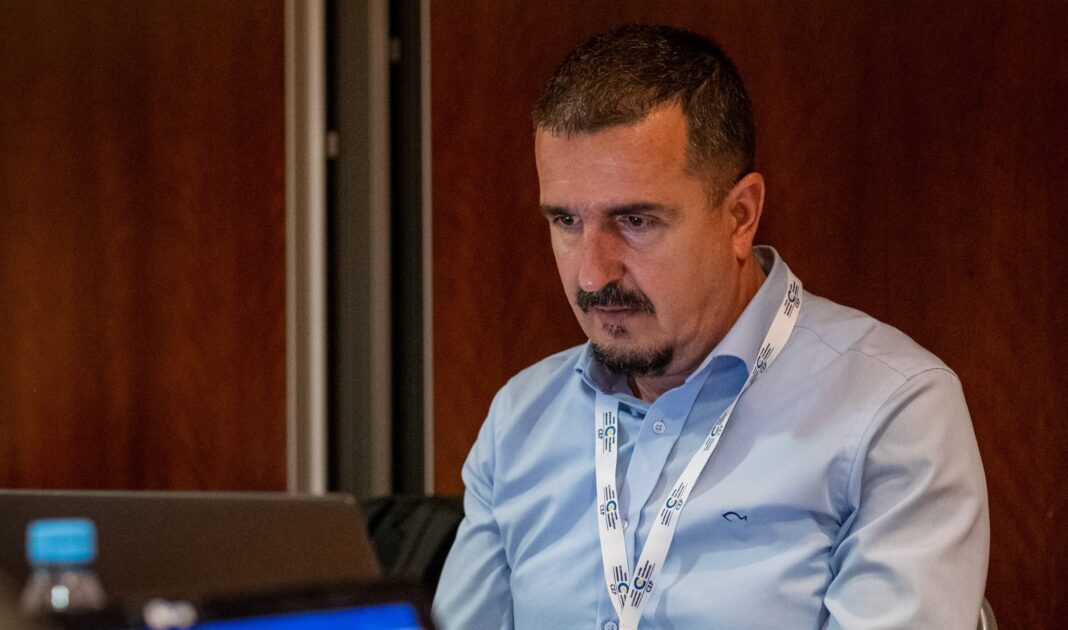By welcoming Pendarovski, Vucic reinforced the perception of the majority of ethnic Macedonians that “Serbia is the greatest friend, while Bulgaria is the greatest threat” to them.
Auhtor: Xhelal Neziri
The President of Serbia, Aleksandar Vučić, welcomed his Macedonian counterpart, Stevo Pendarovski, yesterday. The two met in the Prohor Pcinjski monastery, where the foundations of the North Macedonian state were laid on August 2, 1944, and the Macedonian language was codified. After accompanying him there, Vučić together with Pedarovski traveled to Vranje for a joint lunch. To show closeness and brotherhood, Vucic even posted a photo on his Instagram profile where he wrote: “With Stevo Pendarovski on the way to Vranje, where we will host him as he deserves – Serbian specialties and our best wines from the states and our sister peoples. Long live the friendship of the Republic of Serbia and North Macedonia”. The two met in the Prohor Pcinjski monastery, where the foundations of the North Macedonian state were laid on August 2, 1944, and the Macedonian language was codified. After accompanying him there, Vučić together with Pedarovski traveled to Vranje for a joint lunch. To show closeness and brotherhood, Vucic even posted a photo on his Instagram profile where he wrote: “With Stevo Pendarovski on the way to Vranje, where we will host him as he deserves – Serbian specialties and our best wines from the states and our sister peoples. Long live the friendship of the Republic of Serbia and North Macedonia”.
With the redraw of the borders of the Yugoslav republics, the Prohor Pcinjski monastery belonged to Serbia, even though it is located very close to the border with North Macedonia. From 2004, the Serbian Orthodox Church (SOC) forbade Skopje to organize the registration of citizenship in this country, making it impossible for Macedonian political-ecclesiastical delegations to visit the country where the Republic was born. This decision of the KOS also had the support of politics in Belgrade, who wanted to maintain their influence in the RMV through the non-acceptance of the Macedonian Orthodox Church (KOM) and the formation of a new church institution, parallel to the KOM. The Skopje-Belgrade ecclesiastical dispute had greatly fluctuated the relations between the peoples, since the non-acceptance of the KOM implied the non-acceptance of the Macedonian ethnic identity. Unlike the identity of the Albanians, that of the peoples of the Orthodox religion also has the autocephalous church as an identity pillar. So the church, language, history, myths, traditions and other features are the components of Macedonian ethnic identity.
The major turning point occurred in 2020, when Bulgaria vetoed the integration of North Macedonia into the European Union (EU). This veto, which received the support of all Bulgarian political forces, was accompanied by a hardening of tones in the direction of denying the language and history of the Macedonians, claiming that before 1945 they did not exist as such. This seems to have been a long-awaited moment from Belgrade. Influence and control over Macedonia has been a source of rivalry between Bulgaria and Serbia since the Treaty of Saint Stephen in 1878, when both countries gained autonomy from the Ottoman Empire. The hardening of Bulgaria’s approach prompted Serbia’s strategic softening. Last year, KOS accepted the autonomy of KOM, thus solving a decades-old problem. With this, he put an end to the period of contestation of the Macedonian ethnic identity, but at the same time marked the beginning of the “Serbo-Macedonian brotherhood”. This narrative permeated yesterday’s meeting between Vucic and Pendarovski. At a time when Bulgaria is presented in the media as increasingly hostile to North Macedonia, the Serbian people are offered as a brother who “protects the endangered Macedonians”.
This strategic approach of Belgrade seems to give the expected results. Almost all reliable measurements of public opinion show this. In a survey conducted by the think-tank “Eurothink” based in Skopje, it can be seen that 70.7% of supporters of the opposition VMRO-DPMNE of Hristijan Mickovski think that Bulgaria is the biggest threat to North Macedonia. In Prime Minister Dimitar Kovacevski’s SDSM, this percentage is even higher, i.e. 80.9%, even though this party is promoting constitutional changes with the aim of including ethnic Bulgarians in the Constitution. The voters of Ali Ahmet’s DUI (58.7%), Arben Taravar’s Alliance for Albanians (68.2%), Bilall Kasami’s BESA (61.4%) see Bulgaria as a threat, while a smaller percentage appear supporters of Menduh Thaç’s DPA (24%). In general, 71.5 percent of Macedonians and 55.6 percent of ethnic Albanians see Bulgaria as a threat.
As for who is North Macedonia’s friendliest country in the first place, as can be expected, in the latest polls it is Serbia. This opinion is shared by 58.2 percent of VMRO-DPMNE supporters, 41.9 percent of SDSM, and 48.9 percent of Dimitar Apasiev’s Levica. NATO, the EU, the USA, Kosovo and Turkey are seen as friendlier to the supporters of the Albanian parties.
This means that Sofia’s change of course towards Skopje in 2020, when Bulgaria turned from a strong supporter of the Euro-Atlantic integration process into an unwavering blocker, was a wrong strategic move that can hardly be improved. Or as the prime minister of that time, Zoran Zaev, said in the original, it was “teshka strateshka greshka (serious strategic mistake)”.
By welcoming Pendarovski, Vucic reinforced the perception of the majority of ethnic Macedonians that “Serbia is the greatest friend, while Bulgaria is the greatest threat” to them.

